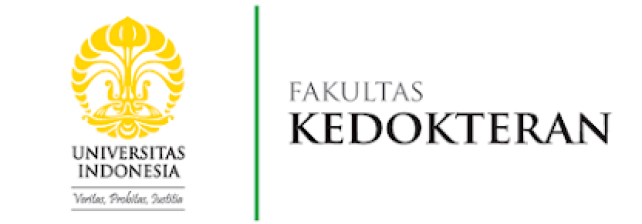15.2.1 Events about Sustainable Use of Land
Student Participation in Planting
This activity involves outreach and commitment statements to new students or graduates of FKUI, encouraging them to support the vision of a green campus. This includes bringing reusable tumblers, minimizing plastic use, and taking care of the environment to promote conservation.
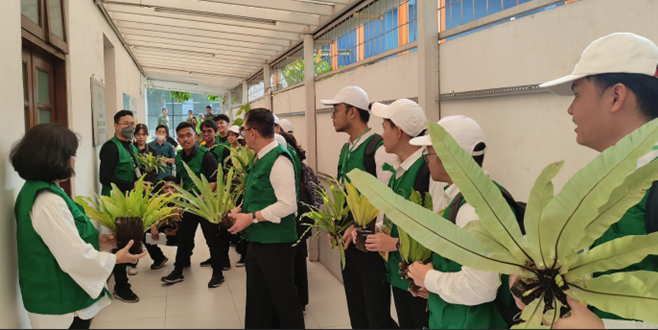
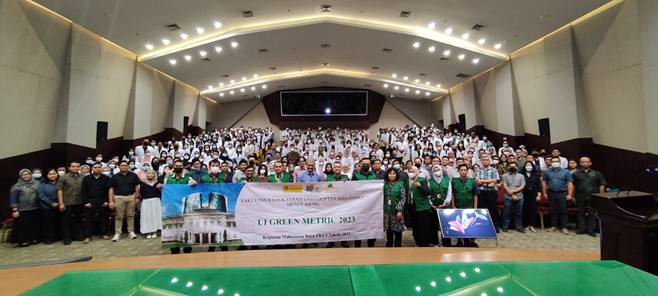
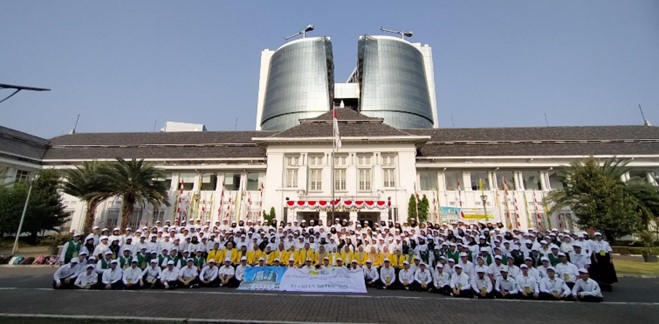
Inauguration of Taman FKUI
Alumni FKUI 1960, Prof. Res. (Hons). dr. Kahar Tjandra, Sp.PK, has generously donated a garden project at the FKUI Salemba campus to express his love for his alma mater. The garden, named Taman FKUI, was inaugurated by Dean Prof. Dr. dr. Ari Fahrial Syam, Sp.PD-KGEH, MMB on September 29, 2022. Located between the Departments of Biochemistry and Molecular Biology, the Pharmacy Department, and the Health Research Ethics Committee, this garden enhances the campus environment by providing a refreshing green space.
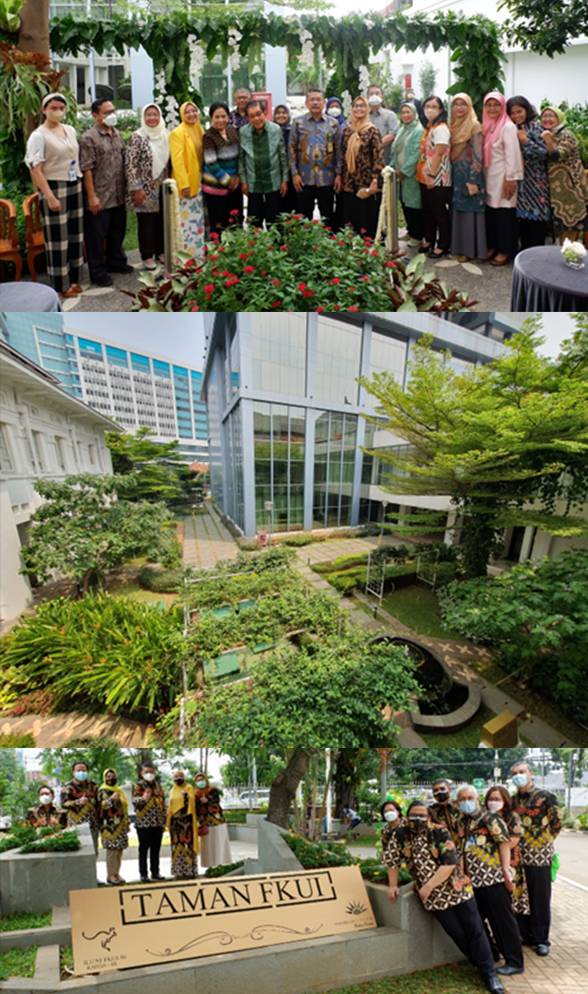
Inauguration of Taman Anggrek
Dean of FKUI, Prof. Dr. dr. Ari Fahrial Syam, Sp.PD-KGEH, MMB, inaugurated a new facility on the FKUI Salemba campus: the Orchid House (Rumah Anggrek). This conservation area for orchid plants was a gift from alumnus Prof. Res. (Hons). dr. Kahar Tjandra, Sp.PK. The Orchid House adds to the list of communal open spaces available on the FKUI Salemba campus for the benefit of the entire FKUI community.
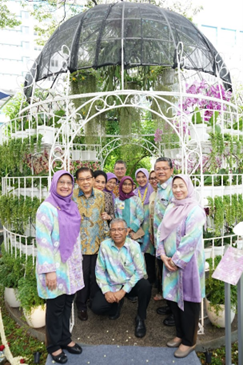
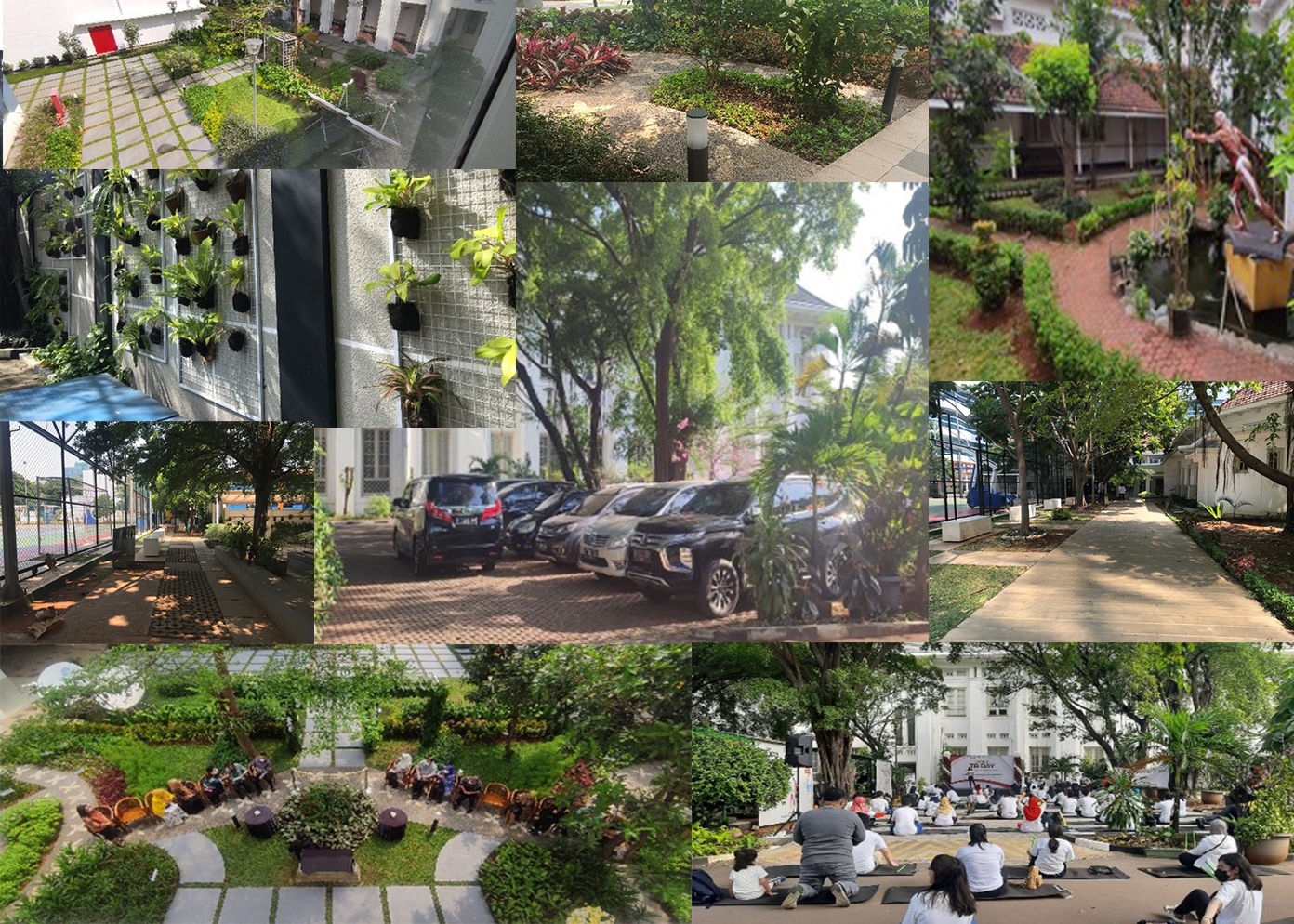
15.2.3 Maintain and extend current ecosystems’ biodiversity
Work directly to maintain and extend existing ecosystems and their biodiversity, of both plants and animals, especially ecosystems under threat
FKUI Work directly to maintain and extend existing ecosystems and their biodiversity through several efforts recorded:
-
-
- Planting trees and plants in all green land zone across the campus also includes green areas inside the building.
- Planting zodiac plant as the natural mosquito repellent (38 plants across the campus)
- Planting 19 different herbal plants that can be used as natural drug sources, this herbal plants spread across the green land zone on campus
- Reusing plastic bottles as hydroponic plant medium
- Reducing vehicle parking area to be used as the green land zone in campus
Evidence : https://drive.google.com/drive/folders/1JmAIdLmxxnj4sNG0Hhh8wkWpx8Y7Hy4-?usp=sharing
[15.2.4] Program Pendidikan tentang Ekosistem
Program Fakultas yang berdampak dalam perubahan iklim:
Mata Kuliah berkaitan dengan iklim
| No. |
Program Studi |
Judul Mata Kuliah |
| 1 |
S2 Gizi |
1. Ekonomi Pangan dan Ketahanan Pangan |
| |
|
2. Ilmu Gizi Daur Hidup |
| |
|
3. Keamanan Pangan |
| |
|
4. Pengantar Antropologi Gizi |
| |
|
5. Epidemiologi Gizi |
| |
|
6. Promosi Kesehatan dalam Program Gizi |
| |
|
7. Gizi & Penyakit |
| |
|
8. Ilmu Bahan Pangan |
| |
|
|
| 2 |
S1 KKI |
1. Medical Ecology |
| |
|
2. Basic Biomedical Science |
| |
|
3. Humanities, Professionalism, Cultural and Competence |
| |
|
4. Adult Learning |
| |
|
5. Empathy, Ethics and Professionalism |
| |
|
6. Primary Health Care Services |
| |
|
7. Pre-Internship |
| |
|
8. Tropical Infection |
| |
|
9. Kolaborasi Pengelolaan Masalah Kesehatan |
| |
|
10. Disaster Management |
| |
|
|
| 3 |
S1 Reguler |
1. MPKT B – Science, Technology, & Health |
| |
|
2. Ilmu biomedik dasar |
| |
|
3. MPKT A -humaniora |
| |
|
4. Kolaborasi pengelolaan masalah kesehatan |
| |
|
5. Pengelolaan Bencana |
| |
|
6. Empati, Etika dan Profesionalism |
| |
|
7. Infeksi tropis |
| |
|
8. Dasar Kedokteran Herbal |
| |
|
9. Sistem Pelayanan Kesehatan Primer |
| |
|
10. Kompetensi budaya dalam penanggulangan penyakit tropik dan infeksi |
| |
|
11. Ekotoksikologi |
| 4 |
Profesi Dokter Reguler |
1. Kolaborasi Pengelolaan Masalah Kesehatan II |
| |
|
2. Modul Pengambilan Keputusan dan pemecahan masalah teraeutik |
| |
|
3. Modul Malaria |
| |
|
4. Modul teknologi dan komunikasi pada konseling |
| |
|
5. Modul Pre-internship Urban |
| |
|
6. Modul Pre-internship Rural |
| |
|
7. Modul Pengaruh Relatif Tinggi Kelembaban terhadap penyakit tropik dan infeksi |
| |
|
8. Modul peresepan rasional dalam pembuatan sediaan kosmetik dan dasar pengobatan herbal |
| |
|
9. Kompetensi Budaya dalam penanggulangan penyakit tropik dan infeksi di layanan kesehatan primer |
| |
|
|
| 5 |
S2 Biomedik |
1. Bakteriologi Dasar |
| |
|
2. Mikrobiologi Lingkungan |
| |
|
3. Virologi Dasar |
| |
|
4. Infeksi protozoa |
| |
|
5. Malaria |
| |
|
6. Filariasis |
| |
|
7. Infeksi cacing darah dan jaringan |
| |
|
8. Infeksi cacing usus |
| |
|
9. Antropoda sebagai vektor dan penyebab penyakit |
| |
|
10. Fisiologi lingkungan khusus |
| |
|
11. Mikologi dasar |
| |
|
12. Jamur penyebab penyakit |
| |
|
|
| 6 |
S2 Kedokteran Kerja |
1. Higiene industri 1 |
| |
|
2. Prinsip K3 Promosi Kesehatan dalam K3 |
| |
|
3. Higiene Industri 2 & AMDAL |
| |
|
4. Plant Survey Industri |
| |
|
5. Kerja Penyelaman & Hiperbarik |
| |
|
6. Plant Survey Kedokteran Penerbangan |
| |
|
7. Higiene Bandara & Penerbangan |
| |
|
8. SAR dan evakuasi |
| |
|
9. Toksikologi industri |
| |
|
10. Fisika penyelaman dan hiperbarik |
| |
|
11. Hukum perundang-undangan dan etika medikolegal bidang kedokteran kerja |
| |
|
12. Hukum perundang-undangan dan etika medikolegal bidang kedokteran penerbangan |
| |
|
13. Hukum perundang-undangan dan etika medikolegal bidang kedokteran kelautan |
| |
|
|
| 7 |
Spesialis Kedokteran Okupasi |
1. Analisis mengenai dampak ligkungan |
| |
|
2. Dasar higiene industri |
| |
|
3. Higiene industri terapan |
| |
|
4. Manajemen risiko di lingkungan kerja |
| |
|
5. Toksikologi industri |
| |
|
6. Kedokteran kebencanaan industri |
| |
|
7. Terapan kedokteran kebencanaan industry |
| |
|
8. Praktik industri kecil sektor informal |
| |
|
9. Praktik industri besar |
| |
|
10. Praktik industri menengah |
| 8 |
Prodi PPDS dan SP 2 |
Quality and Safety (sebanyak 32 prodi PPDS dan 6 prodi SP2) |
| 9. |
Prodi KKLP |
37 Mata Kuliah |
Deskripsi:
Jumlah mata kuliah yang berkaitan dengan keberlanjutan lingkungan di FKUI sebanyak 587 Mata Kuliah.
Link daftar mata kuliah lainnya dapat di akses di link berikut:
https://drive.google.com/drive/u/0/folders/1KTPLRPp7koec8eLVFOc_GDf8j3s-OSje
